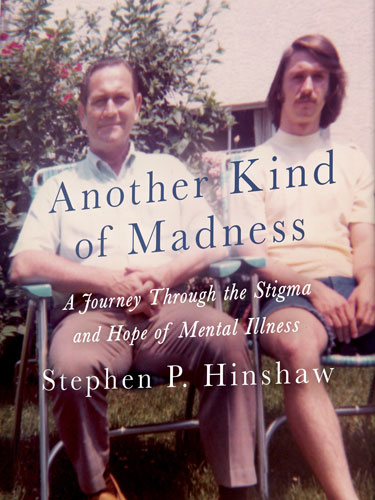Another literary win against the stigma of mental illness
Psychologist's award-winning book chronicles his ordeal with his father's secret bipolar disorder.

December 11, 2018
As a boy in Columbus, Ohio, Stephen Hinshaw didn’t understand why his father, Virgil Hinshaw Jr., an eminent philosophy professor whose mentors included Bertrand Russell and Albert Einstein, kept disappearing.

Stephen Hinshaw (right) with father Virgil Hinshaw Jr.
It wasn’t until Hinshaw’s late teens that he discovered his father suffered from a severe mental illness – long misdiagnosed as schizophrenia – that forced him into involuntary hospitalizations. As per the orders of his father’s physician, the illness and treatments had to be kept strictly secret from Hinshaw and his sister.
Inspired by his family’s ordeals to go into clinical psychology, Hinshaw eventually helped to get his father a correct diagnosis and treatment for bipolar disorder.
The confusion, shame and eventual reveal of his father’s tragic predicament – and its impact on the family – has led Hinshaw, 66, an award-winning UC Berkeley professor of psychology, to publish three books about the stigma of mental illness.
His latest, Another Kind of Madness: A Journey through the Stigma and Hope of Mental Illness (St. Martin’s Press, 2017), just won the American Book Fest’s 2018 award for best autobiography or memoir. The paperback edition will come out in the spring.
“It’s a deep dive into my family’s enforced silence about my father’s lifelong misdiagnosed and heavily stigmatized mental illness,” says Hinshaw. “It’s more intense than anything I’ve written before, interwoven with commentary on what stigma is and why we need to move the dial on reducing it.”
More than 2,000 books were submitted this year to the annual contest of the American Book Fest, an online publication promoting books from mainstream and independent publishers. Hinshaw’s book, also a finalist in the psychology/mental health category, has resonated with a wide range of readers.
“Another Kind of Madness is one of the best books I’ve read about the cost of stigma and silence in a family touched by mental illness,” wrote actress Glenn Close in a review. “It’s a masterpiece.”

Courtesy of Stephen Hinshaw
An expert on developmental psychopathology, including ADHD, Hinshaw has published more than 350 research papers and chapters, and several widely acclaimed books, including The ADHD Explosion: Myths, Medication, Money and Today’s Push for Performance (2014); The Triple Bind: Saving our Teenage Girls from Today’s Pressures and Conflicting Expectations (2009) and The Mark of Shame: Stigma of Mental Illness and an Agenda for Change (2006).
His 2002 book, The Years of Silence Are Past: My Father’s Life with Bipolar Disorder, was a biography of his father, a graduate of Stanford, the University of Iowa and Princeton who taught at Ohio State University for nearly 50 years.
Unbeknownst to his son and daughter throughout their childhood, the elder Hinshaw was undergoing frequent hospitalizations and primitive forms of shock therapy. As is common among families where secrets leave children confused and ashamed, Hinshaw often believed he was to blame for his father’s disappearances.
Unlike his first chronicle of Virgil Hinshaw Jr.’s life, Another Kind of Madness “is far more focused on what it was like to grow up in a home where my father’s mysterious and lengthy absences were never allowed to be discussed — and the impact on children when family secrets are front and center,” Hinshaw says.
The book also graphically details his fear that “I would be next to join the family legacy of psychosis and brutal hospitalization,” Hinshaw says. “It took years before I opened up enough to correctly diagnose him with bipolar disorder and talk with others about our family’s secrets.”
As for the main takeaway of Another Kind of Madness, “Despite our greater knowledge of mental illness in modern times, pervasive shame and stigma are still the core factors preventing treatment, better research and a more inclusive society,” Hinshaw says. “If we don’t discuss mental disorder openly, the world economy falters and everyone loses.”